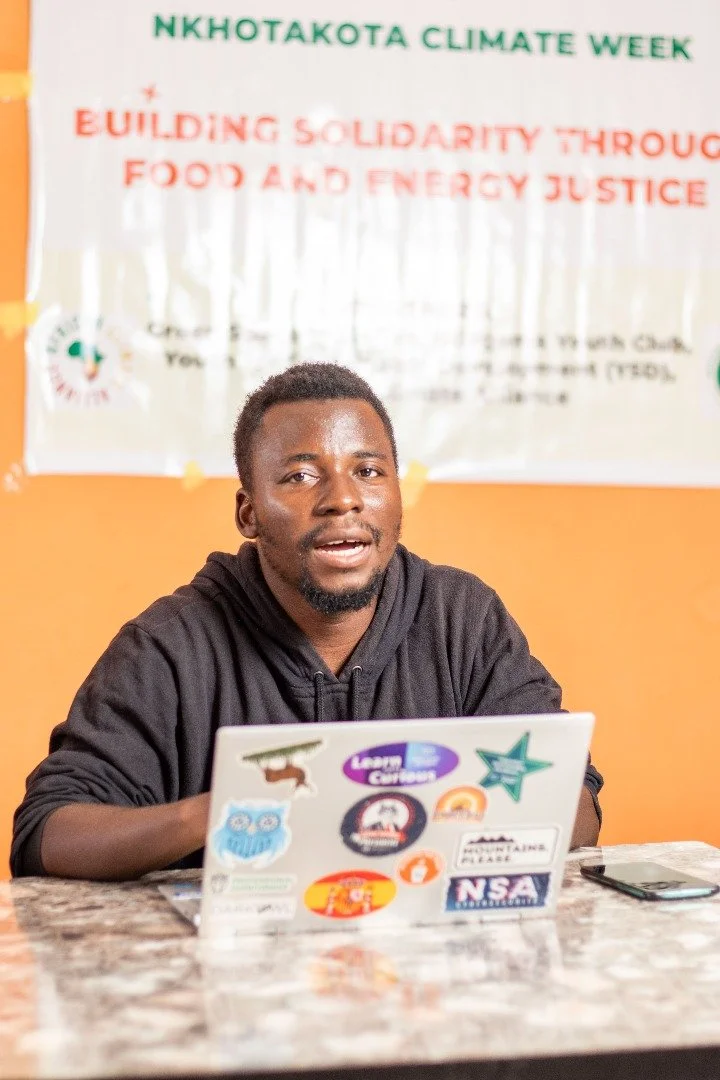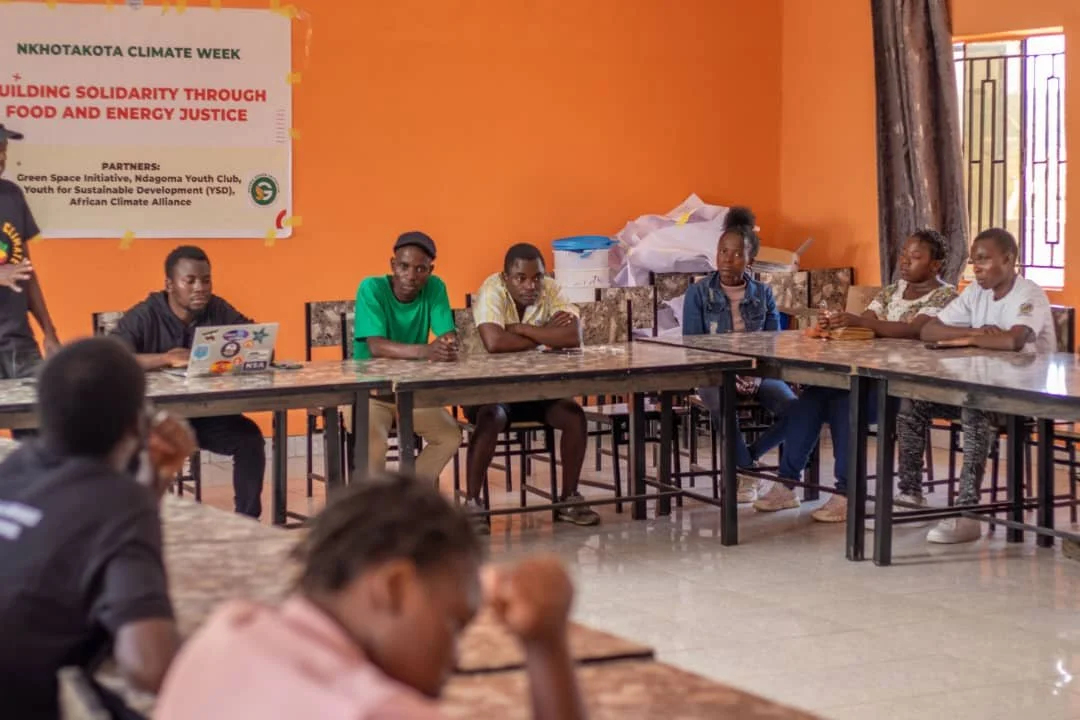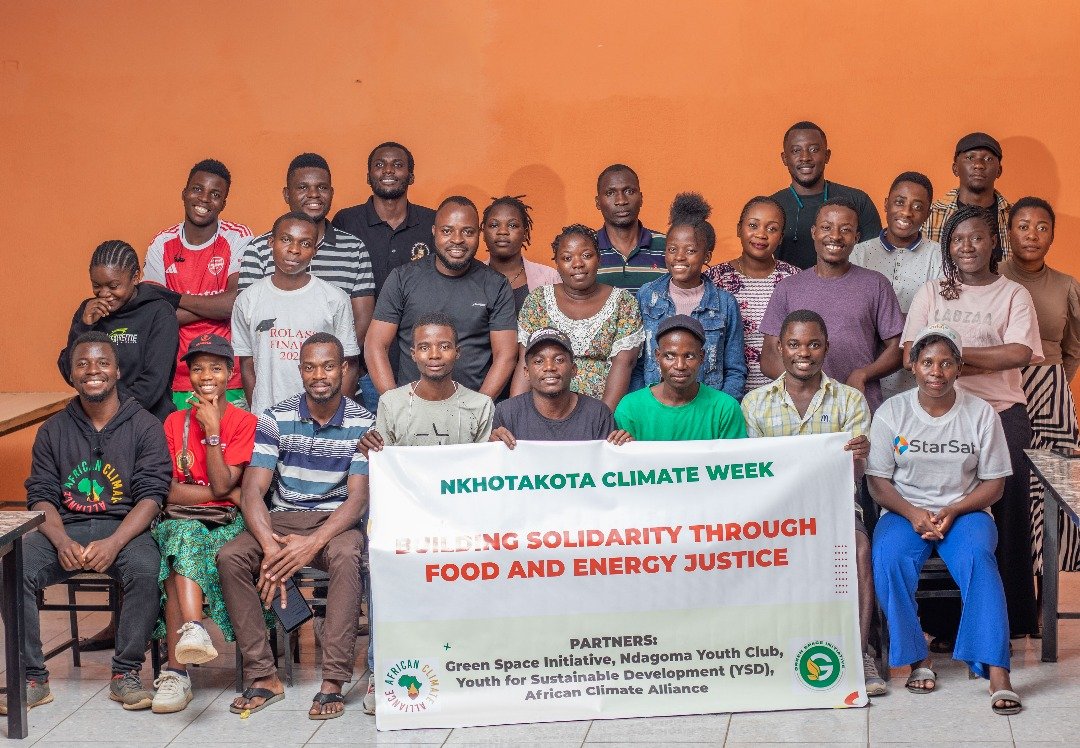Activist Spotlight: Yotam Cheketa on Addressing Malawi’s Lack of Climate Education
An interview with Yotam Cheketa, a Malawian African Climate Alliance Ambassador, showing us why climate literacy is the key to inclusive, community adaptation.
Yotam Cheketa is an intersectional justice advocate from Malawi and one of the African Climate Alliance Ambassadors leading youth-driven climate action across the continent. His activism began in 2021, motivated by a growing awareness of how climate change was threatening the livelihoods and well-being of his community. Since then, Yotam has dedicated his efforts to tackling the root causes of environmental and social injustices through education, community engagement, and advocacy for inclusive solutions.
In September, as part of our month of community-led climate action – featuring Cape Town Climate Week, Johannesburg Climate Week, and 8 community-based initiatives led by youth across the continent – Yotam co-hosted an event in Nkhotakota on the theme “Building Solidarity Through Food and Energy Justice.”
The one-day workshop brought together local farmers, youth, and community members to explore how food systems, energy use, and environmental sustainability are interconnected — and why climate justice must begin with empowering those most affected.
We interviewed Yotam as part of our Activist Spotlight series to learn more about his journey and his African Climate Alliance Climate Week event.
Below are some of the highlights including:
The realities of the climate crisis in Malawi,
Why climate literacy is essential for helping communities adapt to climate change,
And the importance of youth participation and climate education in building resilience.
What inspired you to join the African Climate Alliance?
I joined the African Climate Alliance because of its commitment to amplifying the voices of African youth on climate action. This opportunity gave me a platform to be part of young people advocating for a change in Africa.
What does climate justice mean to you personally and in your community’s context?
Malawi is facing several climate-related challenges, some of which are floods and strong winds. For example, we were hit by Cyclone Fredy and Anna, which resulted in the loss of hundreds of people’s lives, the destruction of infrastructure, food systems, and the disruption of energy supply. Deforestation has also heavily affected Malawi, leading to loss of biodiversity and soil erosion.
Another challenge is the lack of climate education. Climate literacy is essential for empowering communities to understand and adapt to climate change impacts and to make informed decisions about climate-resilient practices. By improving climate literacy, Malawians can better mitigate the effects of climate change, enhance their resilience.
Climate justice to me means ensuring that the most vulnerable communities have access to the resources and support they need to adapt to climate change. Not only that, but also uprooting injustices and inequalities in society and working towards a sustainable future. For example, there is less youth representation in decision-making, cultural practices that sideline girls and women from participating fully in the development sectors, and also lack of financial support for young people to implement their projects.
Tell us about your Climate Week action — what was it, and what inspired the idea?
With support from African Climate Alliance, I was part of the team that organized Nkhotakota Climate Week Action on the theme of “building solidarity through food and energy justice”. It was a one-day workshop that sought to build understanding of the intersections of food and energy systems and also to explore strategies for building unity among communities for climate justice. The idea was inspired by the need for climate education and action in our community.
By engaging Malawian youth and communities in discussions around food and energy justice, we can empower them to become leaders in driving sustainable energy and food consumption practices. We recognized that we need to understand the intersections of many factors as we are solving climate-related problems. For example, understanding the energy type and source we use to process food products, as well as converting wastes from food processes to clean usable energy.
Your event focused on the Climate Week theme of food and energy justice. Why is this so important to you?
Food and energy justice are critical issues in Malawi, where many people struggle to access necessities like food and energy. Most vulnerable communities use energy sources such as “charcoal burning,” polluting the air, and at the same time contributing to high rates of deforestation. I took an action on energy justice to promote sustainable energy practices that prioritize the needs of vulnerable communities without harming the environment.
Was there a moment during your action that stood out to you — something that made you feel proud, surprised, or hopeful?
A local farmer shared their experience with sustainable farming practices and the positive impact it had on their livelihood. It was inspiring to see the resilience and adaptability of our community members and the potential for climate action to drive positive change.
What message would you share with other young people who want to take climate action in their own communities?
Climate action is a human right issue. Get involved and demand action from leaders. Together, we can create a just society and a sustainable future.
What was the African Climate Alliance's month of climate action?
This year in September, across 19 events and 6 countries, we connected the dots between climate change and our many social crises. We showed that the climate crisis is not just about changing weather patterns, but it’s a human rights crisis that amplifies existing inequalities. It touches our lives when it comes to how we access food, water, energy, housing, transport, and impacts gender inequity.
Simply put: for the first time, September was our month of climate action.
We hosted the fourth Annual Cape Town Climate Week, the first-ever Johannesburg Climate Week, and for the first time, eight of our African Climate Alliance Ambassadors — young climate leaders who have been through our year-long mentorship programme — hosted their own Climate Week actions in Zimbabwe, Kenya, Malawi, Zambia, Nigeria, and South Africa.
All of the events brought together activists, community leaders, students, and citizens to learn about the connections between climate change and social injustices and showcase community-led solutions proving that climate justice must include food, water, energy, spatial, and gender justice at its core.
Expanding what started as Cape Town Climate Week across the continent showed us that climate justice doesn’t belong in one place, but can be built everywhere by young people leading in their own communities.
Learn more about Cape Town Climate Week and Johannesburg Climate Week.



